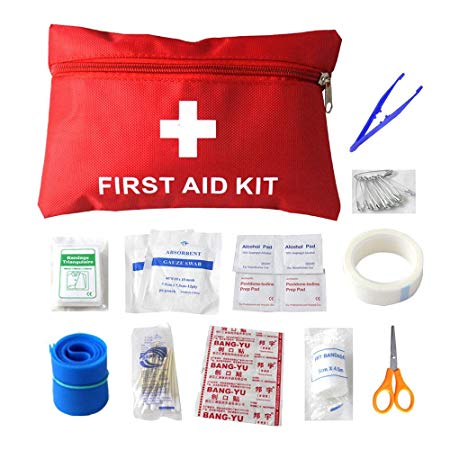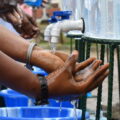First aid is the first and immediate assistance given to any person suffering from either a minor or serious illness or injury, with care provided to preserve life, prevent the condition from worsening, or to promote recovery. Every year in Nigeria, thousands of people die or are seriously injured in incidents. Many deaths could be prevented if first aid is given before emergency services arrive.
The goals of a first aid provider include “preserving life, alleviating suffering, preventing further illness or injury, and promoting recovery.” First aid does not take the place of proper medical care. However, in many cases, medical care is unnecessary and the ill or injured person will safely recover. The aims of first aid are to: preserve life, prevent illness or injury from becoming worse, relieve pain, if possible, promote recovery and as much as possible protect the unconscious.
What are the Importance of First Aid?
Today’s world is increasingly exposed to factors which put individuals in potentially dangerous situations. These factors are called hazards that can be either natural (e.g. earthquakes) or manmade (e.g. a chemical production plant accident). Both can threaten or cause injury to the population as well as have considerable economic and environmental impact. Accidents, however, can happen equally at home or on the road. Road accidents are certainly the first example people think of when highlighting the benefits of first aid, and the needs for those benefits are increasing all over the world. The importance of first aid to public health cannot be over emphasized; basic first aid can mean the difference between life and death. A Red Cross survey showed a staggering 59% of deaths from injuries would have been preventable had first aid been given before the emergency services arrived. The importance of first aid are:
It Helps to save lives
A new report from the British Heart Foundation (BHF) estimated a further 1,000 lives could be saved each year if members of the public attempted to resuscitate heart attack victims. The two main lifesaving methods for someone undergoing a heart attack are cardiopulmonary resuscitation (CPR), and defibrillation. A trained person is more reliable, confident and in control of themselves when an emergency arises. People who are trained are more likely to take immediate action in an emergency situation.
It allows the rescuer to provide the victim comfort
When a first aider is called upon to deal with a victim, they must always remember to safeguard themselves in the first instance and then assess the situation. Having someone trained in first aid can bring immediate relief to the patient. Being calm and assessing the situation helps the patient relax while their injuries are being treated and stabilized until emergency personnel arrive. The positive reaction of those around him or her greatly minimize shock. READ Components of primary health care in Nigeria
It gives you tools to prevent the situation from becoming worse.
First aid helps ensure that the right methods of administering medical assistance are provided. Knowing how to help a person is just as important in emergency situations. It only takes six minutes for the human brain to expire due to lack of oxygen. In some situations, if a patient doesn’t receive basic first aid care immediately, their situation will deteriorate – often rapidly. By being able to provide basic care you can stabilize a patient until emergency medical services arrive. First aid training teaches people how to use basic household items as tools if a first aid kit is not available helping individuals to be able to cope with many situations. Fist aid training guidelines also involves how to collect information and data about what happened and the patients’ condition. This information will be passed on to the emergency services, which saves them time making first aid a valuable link in the chain of survival.
Relieves pain
Acute pain typically starts suddenly in response to an injury , a cut, bruise, burn, broken bone or pulled muscle, for example. A sports injury that isn’t diagnosed and treated properly can lead to long-term damage to joints or muscles. Certain injuries can cause nerve damage that leads to ongoing pain. A lack of first-aid knowledge can increase the risks associated with domestic accidents. Many emergency services report that parents bring their child suffering from burns without having cooled the burnt parts of his body. Having a basic first aid means the injured are likely to get their pains alleviated. To have a first-aid kit at home or in a school is an important preventive measure to keep easily treatable problems at bay and under control speedily. It ensures that the area is well-equipped to deal with an emergency whenever it might arise. In Nigeria, it is a pre-requisite for the establishment of schools in the broader perspective, to not have one is considered a breach of common sense.
It encourages healthy and safe living.
Many companies in Nigeria are beginning to see the importance of first aid as part of employee training; this is a very wise option because it guarantees they can all look out for one another. If an accident happens at work; employees may be able to prevent further injury to the victim of the accident. First aid courses in the work place promote safer practice amongst employees. Disturbing social drinking and eating habits are also a cause for concern. Non-communicable diseases are affecting developing as well as developed countries. Obesity is constantly growing in some countries whose governments know that consequences will impact on their health systems in the next decades from an increase in heart problems, diabetes and blood cholesterol. First-aid training not only helps in accidents, but also promotes a healthier lifestyle. A trained person is better able to assess their surroundings. Knowledge of first aid promotes the sense of safety and well being amongst people. Having an awareness and desire to be accident free keeps a person more safe and reduces the number of causalities and accidents.
Frequently asked Questions On First Aid
What are the basic first aid?
First Aid Basics. The first step in any emergency is the recognition of the problem and providing help. Emergency system dispatchers can guide you through the steps of performing cardiopulmonary resuscitation (CPR), using an automatic external defibrillator (AED), or delivering basic care until additional help arrives.
What is ABC in first aid?
The ABC’s of first aid are the primary things that need to be checked when you approach the victim, Airway, Breathing, and Circulation. Prior to CPR, ensure that the airway is clear, check to see if the patient is breathing, and check for circulation (pulse or observation of color and temperature of hands/fingers).
What are the golden rules of first aid?
Decide if you or the injured person needs medical aid; ask for advice if not sure. Reassure the injured person, if they are severely injured and under shock, and keep them warm.
What are the basic first aid procedures?
First aid is medical attention that is typically administered immediately after an injury or illness occurs. It usually consists of one-time, short-term treatment, such as cleaning minor cuts, treating minor burns, applying bandages, and using non-prescription medicine.
What are the 3 principles of first aid?
One set of goals of first aid is called the “Three P’s”
- Preserve life – stop the person from dying.
- Prevent further injury – stop the person from being injured even more. If possible, an injured person should not be moved.
- Promote recovery – try to help the person heal their injuries.
What should be kept in first aid box?
A basic first aid kit may contain:
- Plasters in a variety of different sizes and shapes.
- Small, medium and large sterile gauze dressings.
- At least 2 sterile eye dressings.
- Triangular bandages.
- Crêpe rolled bandages.
- Safety pins.
- Disposable sterile gloves.
What are some basic first aid skills?
Here are a few first aid skills that everyone should know.
- Stopping heavy bleeding.
- The Heimlich maneuver.
- Using an Automatic External Defibrillator (AED)
- Treating shock.
- Hypothermia treatment.
- Knowing the signs of a stroke.
What are the importance of first aid box in school
- It can prevent the loss of life in a school
- Prevent student and teachers from being injured
- Promotes safety consciousness in schools and institutions help people heal their injuries.





